Testing Windows 10 Performance Before and After the Meltdown Flaw Emergency Patch
The IT world was caught by surprise this week when it was disclosed that nearly every processor sold in the last 20+ years powering all forms of computers could be exploited due to two major hardware flaws (read our 'what you need to know' article). Discovered last year by Google's Project Zero team, manufacturers have been investigating and working on a fix for months, although the public just came to know about this now.
Because of the nature of Meltdown and Spectre, the patches have to come at the OS level, and there's a possibility of performance loss. On the upside for consumers, desktop computing and gaming may not be as affected as other intensive tasks more commonly seen in server and database applications.
Update:Following up to our initial testing (this article), we're looking deeper into the matter by testing a patched desktop system for both Meltdown (OS-level patch) and Spectre (firmware/BIOS update).
Based on the information received so far, we know most Intel CPUs are affected, but this issue also extends to select ARM architectures, while AMD appears to be mostly in the clear. There are three variants of the exploit and AMD is vulnerable to the "Bounds Check Bypass" method but this can be solved via an OS update and should come at an insignificant performance cost. The other two variants reportedly don't impact AMD processors due to differences in their architectural design.
Linux is one of the operating systems that had received an update addressing the exploit before it was disclosed and tech site Phoronix benchmarked performance before and after. They found some pretty crippling performance down turn on server related tests using a Core i7-8700K with a Samsung 950 PRO NVMe storage device. They followed up with a Linux gaming test that looked at half a dozen titles and mostly found the difference was within the margin of error.

With Microsoft pushing out an emergency fix for Windows 10 the same day, we got our chance to run our own tests. Windows 7 and 8 users should be able to get patched directly from the Microsoft website soon, or wait until Patch Tuesday to receive it automatically via Windows Update.
The benchmarks you're about to see were all conducted in the last 12 hours to see what impact this update has on performance for desktop users, if any at all. A few things to note: We've only had time to test the Core i7-8700K, so no older Intel CPUs have been tested yet, nor have we checked to see if this patch has any impact on AMD CPUs.
These are all fresh benchmarks conducted on the same test system under the same conditions. We first updated all the pre-patch data and then applied the patch and re-tested. The gaming performance figures are all based on a three run average. For the storage tests we did things a little differently since those numbers tend to fluctuate more. Normally we'd take the average from three runs, but for this test we've taken the best result for each individual test and shown that instead. We gave the system 4 attempts to post the best result it could and between each run the system was powered completely down and then booted back up. On to the benchmarks...
Storage Benchmarks

Starting with the storage tests we have the AS SSD Benchmark and for these tests I'm using the Samsung SSD 950 Pro with the 8700K. Here we see very similar sequential read and write results, the figures after the update are actually slightly better, though we're talking just a 1-2% difference here.
Where we see a significant difference is when looking at the 4K read result, here we see a very large 23% reduction in performance going from a throughput of 44 MB/s to 34 MB/s. The random 4K write performance though, well that goes unchanged so it's just the random 4K reads that are significantly down.
Interestingly though the 4K-64 thread read and write performance is improved with the patch, the write performance here has been boosted by 17%, so it's certainly not all bad news though I'd argue that the 4K read result is a more serious. Read access time was also 14% lower before the update, the write access time though is much the same.
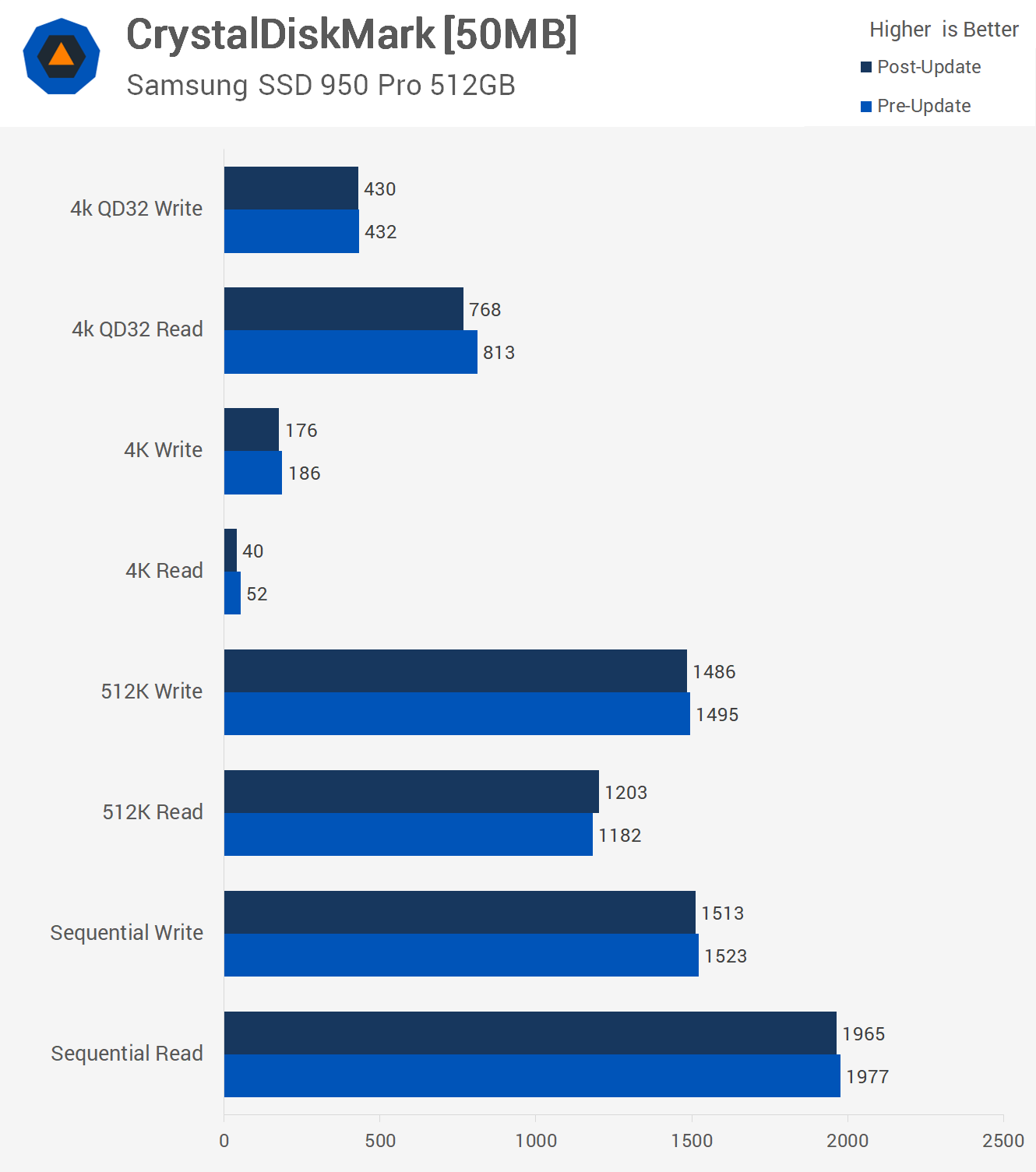
Moving on we find CrystalDiskMark confirms what was seen when testing with AS SSD Benchmark. Here the 4K read performance has been reduced by 23% after the patch. The rest of the margins though are 5% or less so nothing really worth noting.

The last storage focused test I ran was ATTO Disk Benchmark and here we find something interesting. These are all sequential tests so the 4K results here won't necessarily reflect what we saw previously and they clearly don't. However as the file size grows to 16 kilobytes we start to see a noticeable drop in performance with the update. The drop off isn't as significant as the 4K read results seen previously but we are seeing up to a 9% reduction in throughput.
3D Content Creation and Rendering

The Cinebench R15 score is based on an average of three runs and here we see a slight variation in performance but nothing to be alarmed about. The multi-threaded score is reduced by 2% while the single thread score was increased by a percent, so margin of error stuff here.

We see much the same in Blender, the update came in a fraction ahead but again within the margin of error.

Another render test, this time the Corona benchmark and again nothing to report here. So it seems like your rendering workloads won't be impacted.
Productivity Benchmarks
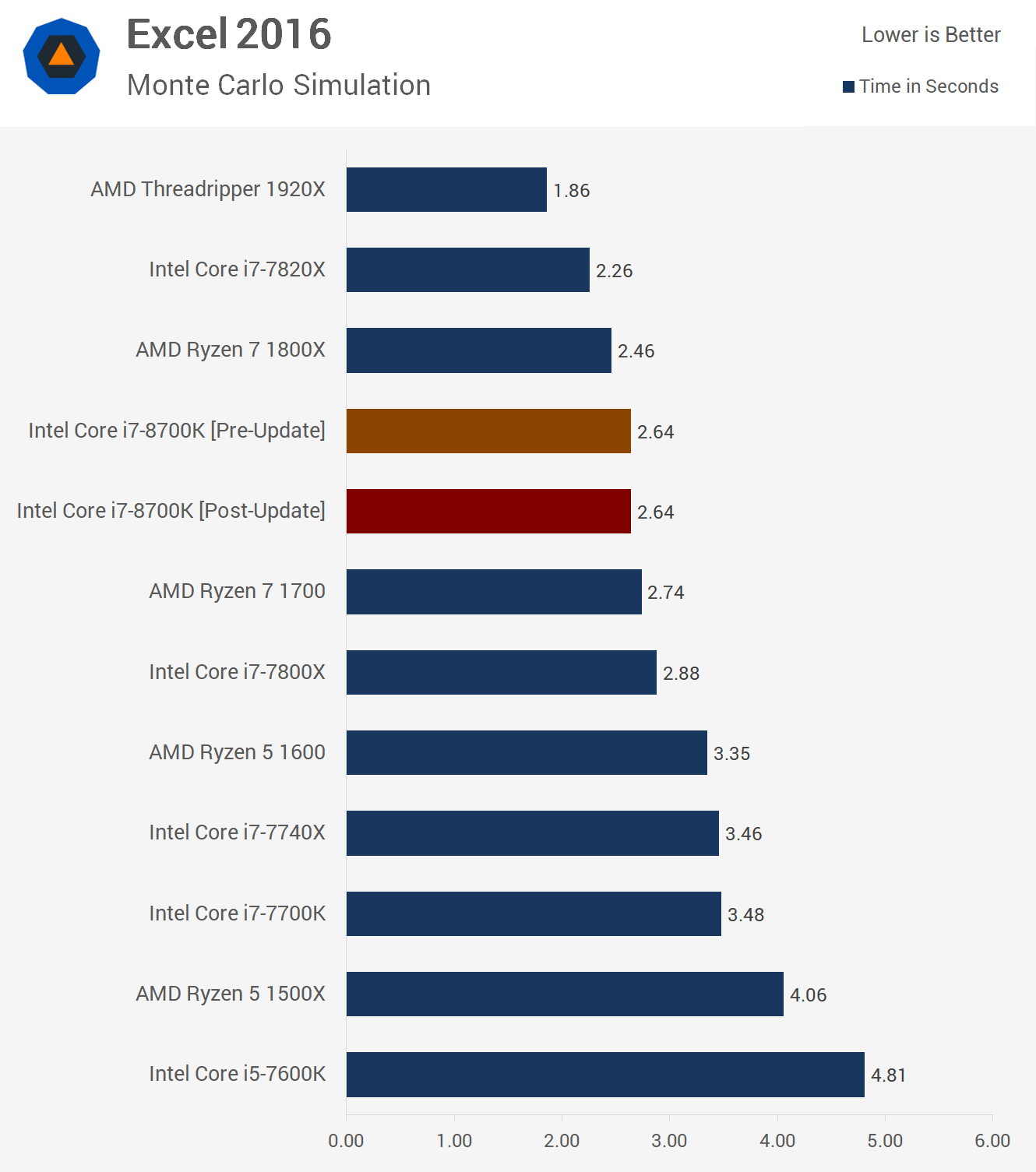
Likewise your spreadsheets will remain as snappy as ever, we see no impact here at all.
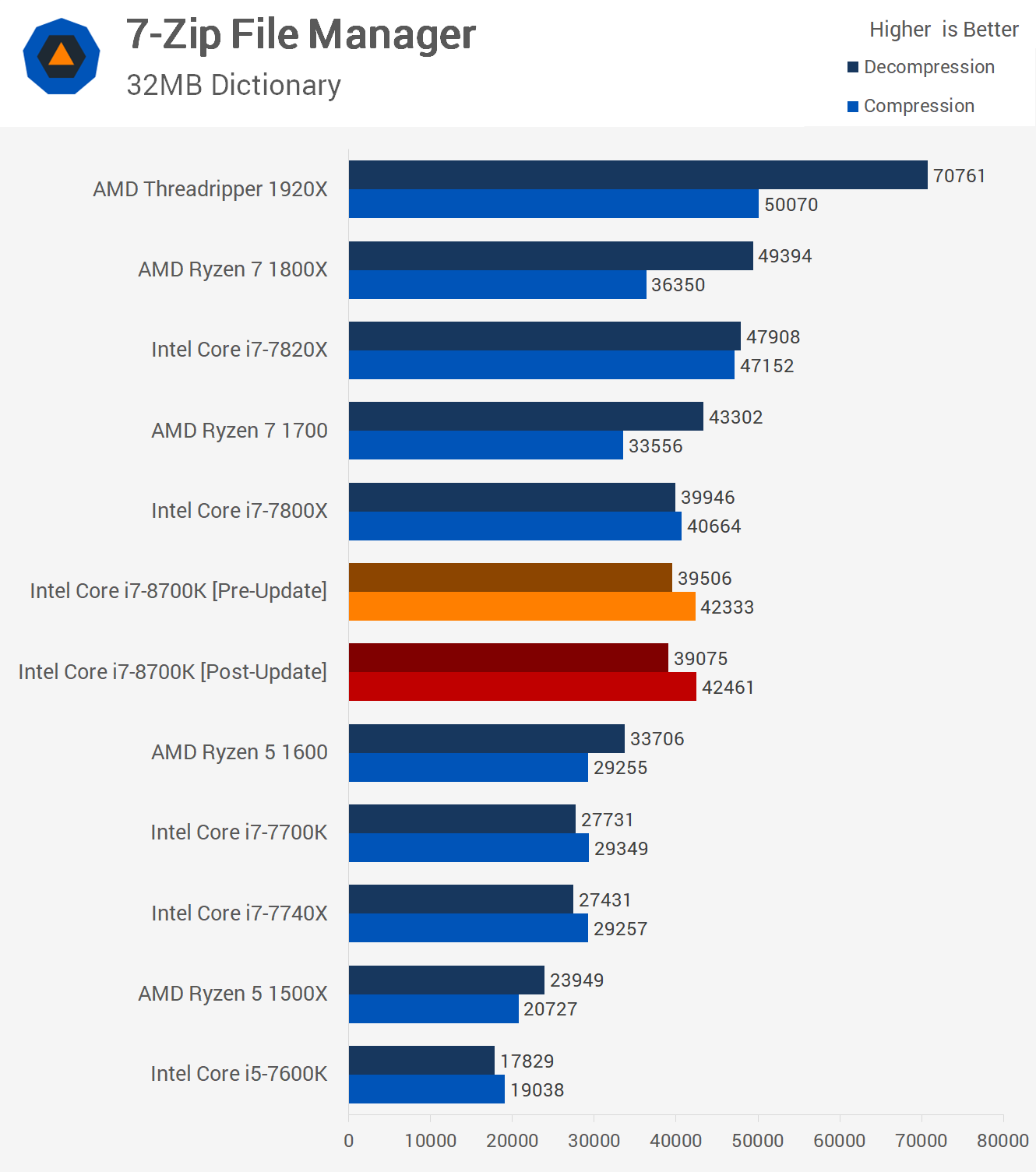
The 7-zip compression and decompression performance looks much the same, again this is within the margin of error for this test.
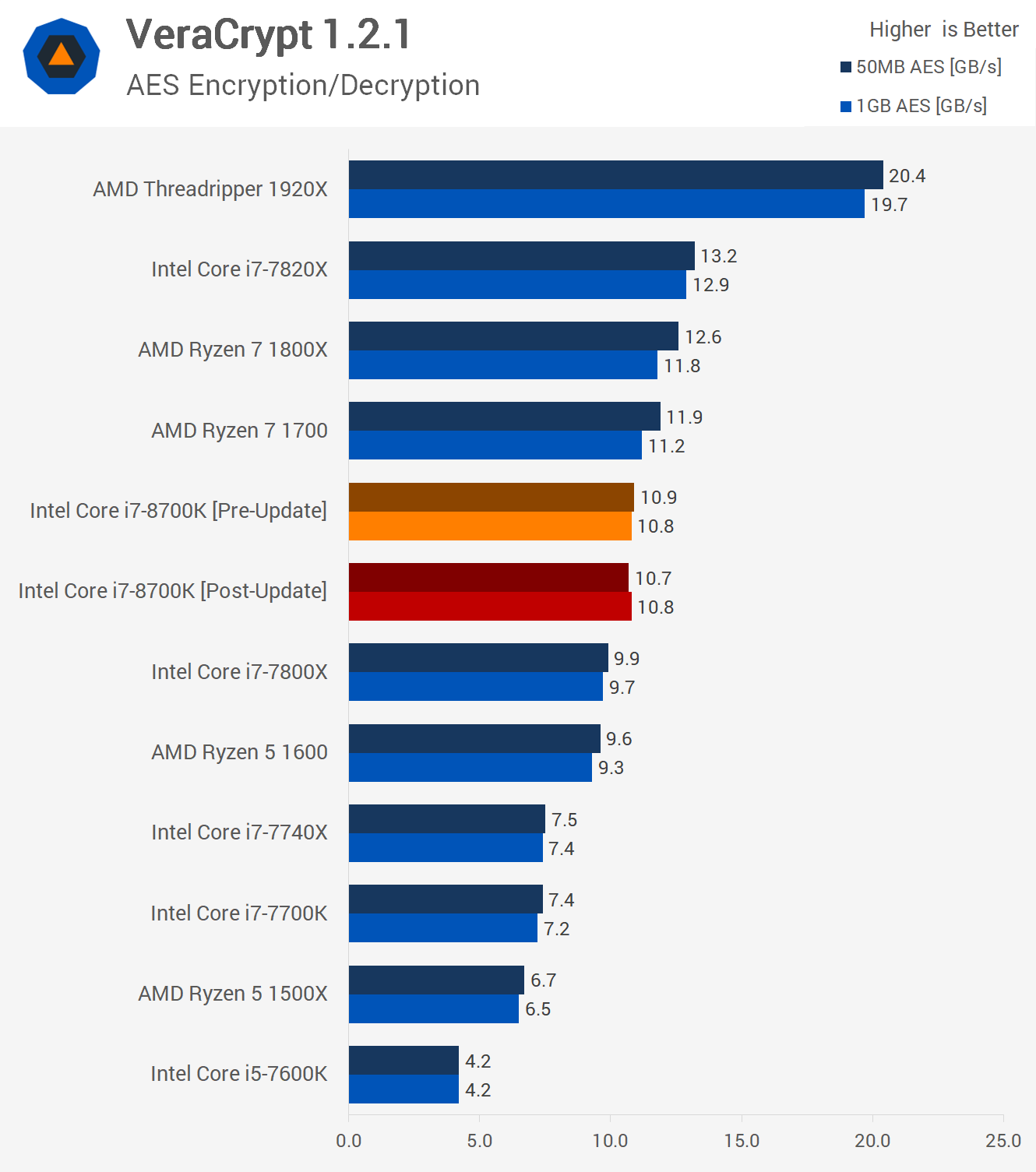
VeraCrypt also saw no difference for the 1GB and 50MB AES encryption and decryption tests.
Gaming Tests
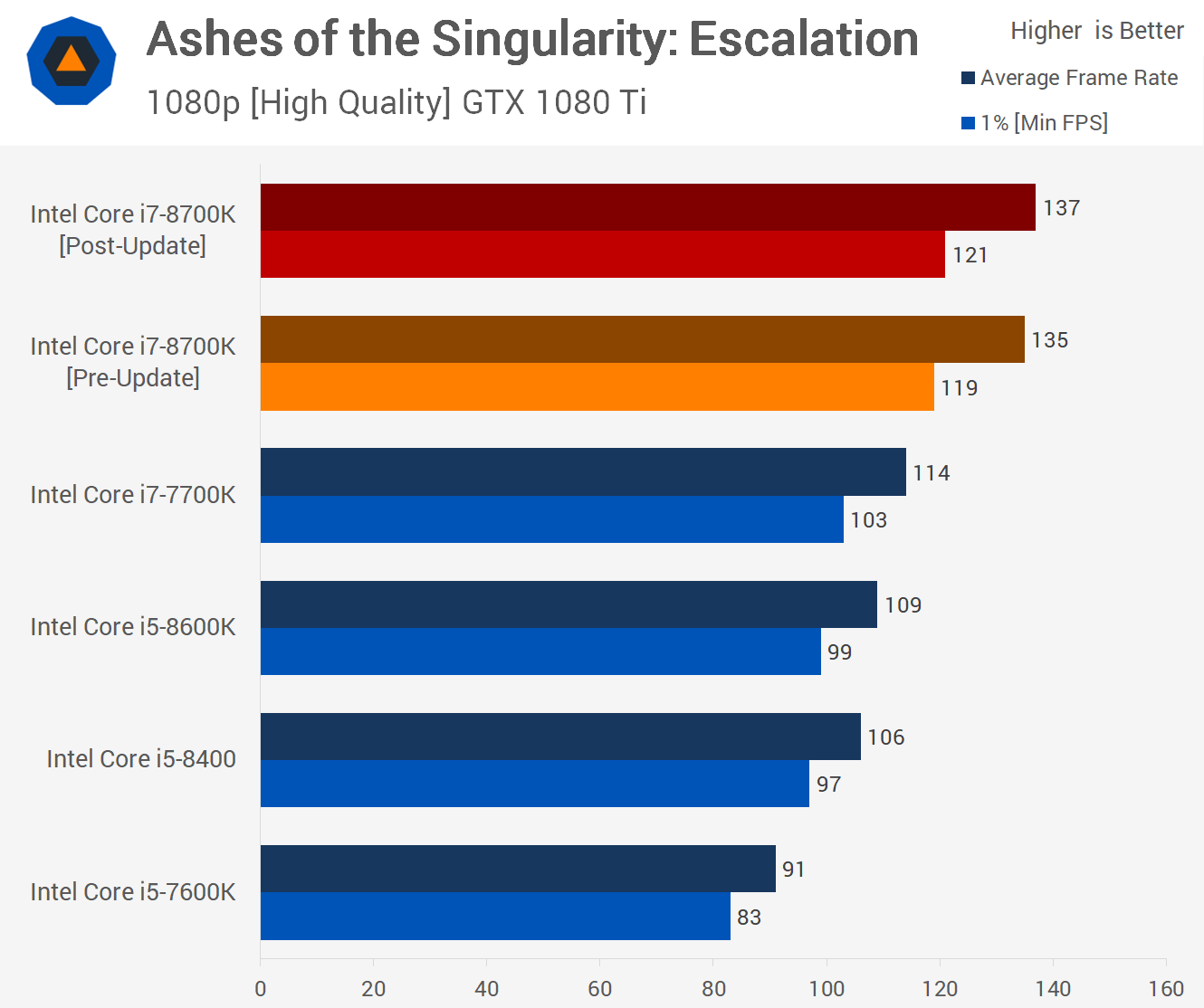
Okay time to get serious with a few gaming benchmarks. First up we have the always dependable Ashes of the Singularity and here we see a small uplift in performance after the patch has been applied. Granted the 1% low result was only improved by 1.7% but still, it's certainly not slower. We're also CPU bound using the high quality preset, not GPU bound.

Boosting the quality preset to crazy results in a GPU limited senario and again we find similar results before and after the patch has been installed.


Assassin's Creed Origins was a game I was really keen to check out due to the type of protection the game uses to stop piracy. That said as you can see, nothing worth talking about here, apart from the fact that the patch has no negative impact on frame rates and switching to the ultra high quality preset doesn't change anything either.


Then we have the Battlefield 1 results and using the medium quality settings at 1080p with the GTX 1080 Ti sees similar performance before and after the patch, in fact again after the patch we see a very minor improvement. This is again seen with the ultra quality settings so things look good with the Core i7-8700K.
Conclusion, so far
Well, there you have it. Desktop users have little to worry about in terms of performance loss, particularly gamers. We've yet to test older CPUs, but given the type of workloads we're seeing impacted by the patch, I don't think there's going to be an issue with any desktop hardware, but we'll certainly report back if there is.
The reduction in 4K read performance for high speed NVMe drives is a concern and while this shouldn't impact any games, any application that is sensitive to this might show a reduction in performance. Of course the brief list of applications I tested showed no real reduction in performance period.
The issue nonetheless remains and is one that has a far bigger potential in affecting servers. It's a serious concern for data centers both on the side of performance and more importantly, security. That's not our area of expertise or interest, so we'll leave that testing to those better equipped to tackle it.
Update (1/5):When we tested and published this article, the Windows 10 emergency fix had been out for just a few hours and no microcode or firmware updates had become available. For laptops and brand name desktops, that means you also have to update your system with new firmware that will come from your respective OEM. For builders, that means you have to wait for an update from your motherboard manufacturer.
As of writing, a handful of companies have started to offer these updates on some of their product lines: Dell, Lenovo/ThinkPads, Asus, Microsoft Surface, and some others. When our test platform receives a security firmware update we plan to add those results to this article. Users around the web have started to post benchmarks of their systems with both patches applied and the result appears to be slightly worse performance than when they had only applied the OS patch.
It's our understanding that the Windows patch and other OS-level updates cover only one of three known vectors for exploiting the flaws. The combination of OS and firmware should cover all three, although in some scenarios application-level patches will also be required to be fully secure. To have a better understanding of Meltdown and Spectre we suggest you read our condensed what you need to know or read the whitepapers.
Update (1/7):Following up to our initial testing, we're looking deeper into the matter by testing a patched desktop system for both Meltdown (OS-level patch) and Spectre (firmware/BIOS update).
友链
外链
互链
Copyright © 2023 Powered by
Testing Windows 10 Performance Before and After the Meltdown Flaw Emergency Patch-口沸目赤网
sitemap
文章
34963
浏览
634
获赞
9425
热门推荐
Instagram's 'Pinned Comments' feature is now available to everyone
If you're trying to inject some positivity into your Instagram posts, the new Pinned Comments featurAmazon Alexa is getting a generative AI revamp
If you've been wondering when voice assistants would get the generative AI treatment, Amazon has you35 Years of Prince of Persia
The Prince of Persia series likely means different things to different generations of gamers, from uAnother judge agrees: AI
There has been a debate raging over whether or not work created by generative artificial intelligencGoogle's Pixel 4a may have been delayed yet again
Google's cheaper Pixel phone is coming a bit later than originally anticipated. According to leakeriPhone 14 vs iPhone 15 price comparison: Which is the better value?
Another September iPhone event has come and gone, and we have officially reached the iPhone 15. TheWebb telescope just made a surprising discovery because of a mistake
Sometimes, mistakes in telescope observations can lead to accidental discoveries. That's what happen10 Games to Chill Out and Lower Your Stress Levels
Like movies, video games can evoke a variety of emotions. Games like Resident Evil or Silent Hill caJameela Jamil posts Instagram about the stretch marks on her boobs
Boob stretch marks. A lot of us have them. But Jameela Jamil has decided to nickname hers "babe markNASA scientists reveal unsettling melting source on Greenland
Pay attention to Greenland. The land's colossal ice sheet — around three times the size of TexNot Intel, Not AMD: Alternative CPU Architectures from Around the World
It's easy to think of the desktop CPU space as a duopoly: on the one hand you have Intel finally traThreads is now available on desktop for some users
As of today, Threads, Instagram's Twitter alternative, is available as a logged-in web experience &mApple could debut its new laptop chip in a Macbook Pro this year
A few weeks after Apple announced it would start developing its own silicon chip for Mac computers,Best software deal: Adobe Photoshop and Premiere Elements 2023 on sale for 37% off
SAVE $55: As of August 30, the Adobe Photoshop Elements 2023 & Premiere Elements 2023 software fLG Gram 17
SAVE $800: On Sept. 20, you can score an LG Gram 17-inch laptop (12th Gen Intel Core i7, 16GB RAM, 1
 科技创新!
科技创新!